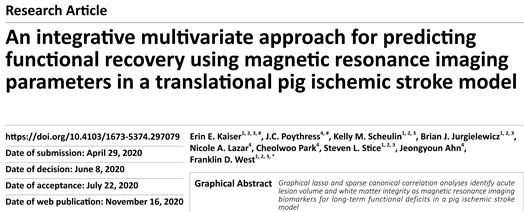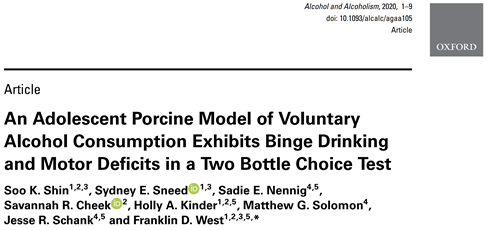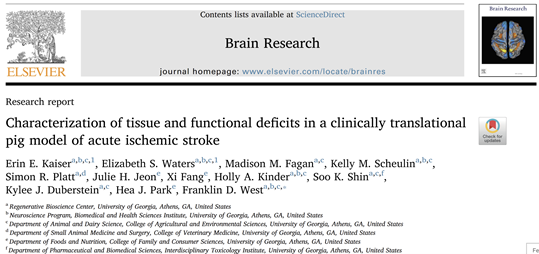Publications
-
Acute magnetic resonance imaging helps predict functional recovery at chronic timepoints post-stroke

Magnetic resonance imaging (MRI) is a clinically relevant, real-time imaging modality that is frequently utilized to assess stroke type and severity. However, specific MRI biomarkers that can be used to predict long-term functional recovery are still a critical need. Consequently, the present study sought to examine the prognostic value of commonly utilized MRI parameters to…
Posted in: Publications -

Harnessing the maximum diagnostic potential of magnetic resonance imaging (MRI) by including stroke lesion location in relation to specific structures that are associated with particular functions will likely increase the potential to predict functional deficit type, severity, and recovery in stroke patients. This exploratory study identified damaged brain structures including the insular cortex, somatosensory cortices,…
Posted in: Publications -

Histopathological analysis of cellular changes in the stroked brain provides critical information pertaining to inflammation, cell death, glial scarring, and other dynamic injury and recovery responses. However, commonly used manual approaches are hindered by limitations in speed, accuracy, bias, and the breadth of morphological information that can be obtained. Here, a semi-automated high-content imaging (HCI)…
Posted in: Publications -

The objective of this study was to characterize brain anatomy and assess spatiotemporal gait parameters in two commonly utilized research pig breeds, Yucatan and Landrace, pre- and post-stroke using magnetic resonance imaging (MRI) and gait analysis. This study demonstrated Yucatan and Landrace pigs exhibit differences in gross brain anatomy and gait patterns pre-stroke. However, stroke…
Posted in: Publications -

Alcohol is one of the most commonly abused intoxicants with 1 in 6 adults at risk for alcohol use disorder (AUD). As such, rodent AUD models are widely studied however, inherent anatomical and physiological differences between rodents and humans pose a number of limitations in studying the complex nature of human AUD. Comparatively, this review…
Posted in: Publications -

The findings of this proof of concept study strongly suggest that administration of Tanshinone IIA loaded nanoparticles (Tan IIA-NP) in the acute phase post-stroke mitigates neural injury likely through limiting free radical formation, thus leading to less severe gait deficits in a translational pig ischemic stroke model. With stroke as one of the leading causes…
Posted in: Publications -

Recently, it has been demonstrated that neurological diseases and associated pathologies correlate with changes in the gut microbiota. However, changes in the microbial community in stroke have not been well characterized. This study investigated the changes in the gut microbiota composition and diversity using a pig stroke model. These findings provide a basis for characterizing…
Posted in: Publications -

Alcohol is of the most commonly abused substances, thus leading to significant medical and financial burdens. Pigs are an attractive model for studying alcohol abuse disorder (AUD) due to comparable alcohol consumption behavior and metabolism. This study investigates voluntary binge drinking behavior and provides a detailed analysis of associated motor function deficits in intoxicated pigs.…
Posted in: Publications -

The acute stroke phase is a critical time frame used to evaluate stroke severity, therapeutic options, and prognosis while also serving as a major tool for the development of diagnostics. To further understand stroke pathophysiology and to enhance the development of treatments, our group developed a translational pig ischemic stroke model. In this study, the…
Posted in: Publications -

Magnetic resonance imaging (MRI) is a clinically relevant non-invasive imaging tool commonly utilized to assess stroke progression in real time. This study investigated the utility of MRI as a predictive measure of clinical and functional outcomes when a stroke intervention is withheld or provided, in order to identify biomarkers for stroke functional outcome under these…
Posted in: Publications